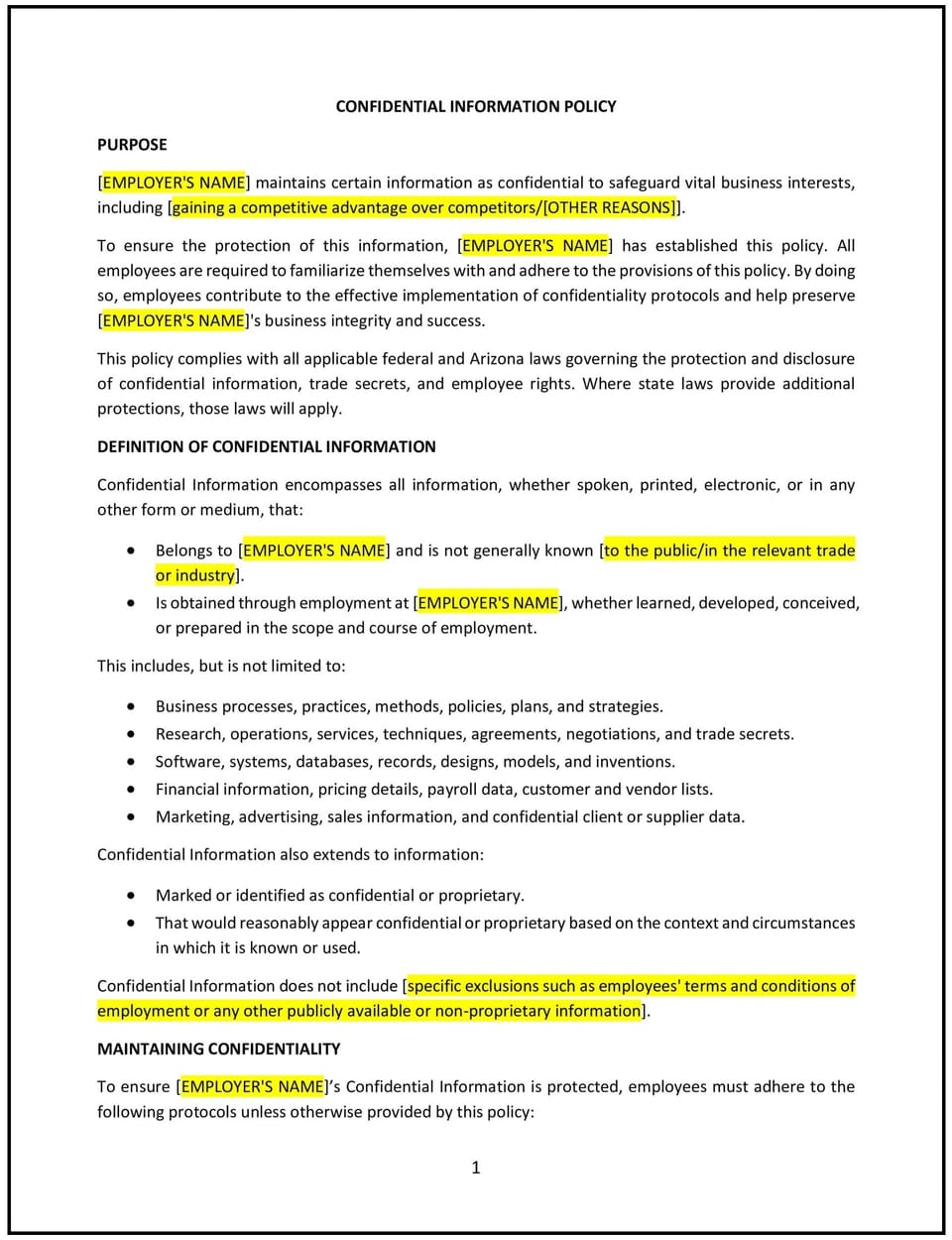Confidential information policy (Arizona): Free template

Confidential information policy (Arizona)
In Arizona, a confidential information policy provides businesses with guidelines for protecting sensitive data and ensuring employees understand their responsibilities in handling and safeguarding confidential information. This policy is essential for maintaining the organization’s competitive advantage, complying with legal requirements, and preventing data breaches.
This policy defines what constitutes confidential information, outlines employee obligations, and establishes procedures for reporting unauthorized disclosures. By implementing this policy, Arizona businesses can protect their assets and foster a culture of trust and accountability.
How to use this confidential information policy (Arizona)
- Define confidential information: Clearly outline what is considered confidential, such as trade secrets, client data, financial records, or proprietary business strategies.
- Specify employee responsibilities: Require employees to handle confidential information carefully, avoid unauthorized sharing, and report any potential breaches immediately.
- Include access controls: Restrict access to confidential information based on job roles and implement security measures like passwords or encryption.
- Address third-party interactions: Establish guidelines for sharing confidential information with vendors, contractors, or partners, including the use of nondisclosure agreements (NDAs).
- Provide breach reporting procedures: Outline steps employees must follow to report unauthorized disclosures or suspected breaches.
Benefits of using a confidential information policy (Arizona)
This policy offers significant benefits for Arizona businesses:
- Protects intellectual property: Safeguards trade secrets and proprietary information, ensuring the company maintains its competitive advantage.
- Enhances compliance: Aligns with Arizona and federal data protection laws, minimizing legal risks and penalties.
- Promotes accountability: Clarifies employee responsibilities for handling sensitive information, reducing the likelihood of accidental disclosures.
- Strengthens trust: Reassures clients, partners, and employees that the organization prioritizes confidentiality and data security.
- Mitigates risks: Reduces the impact of potential data breaches or unauthorized disclosures through clear protocols and preventive measures.
Tips for using a confidential information policy (Arizona)
- Address Arizona-specific laws: Ensure the policy complies with state regulations, particularly those related to privacy and data protection in industries like healthcare or finance.
- Provide employee training: Educate staff on identifying confidential information and implementing best practices for safeguarding it.
- Monitor access: Regularly review access controls to ensure only authorized personnel can handle sensitive information.
- Use NDAs effectively: Require third parties to sign nondisclosure agreements before accessing company information to prevent unauthorized sharing.
- Review regularly: Update the policy periodically to reflect changes in technology, regulations, or business practices.
Q: What is considered confidential information under this policy?
A: Confidential information includes trade secrets, client and employee data, financial records, proprietary strategies, and any other data explicitly marked or understood as confidential.
Q: How can employees protect confidential information?
A: Employees should use secure methods, such as encryption or password protection, avoid discussing sensitive information in public, and report any breaches immediately.
Q: What happens if an employee discloses confidential information?
A: Unauthorized disclosure may result in disciplinary actions, including termination, and could lead to legal consequences depending on the severity of the breach.
Q: How does this policy address third-party interactions?
A: The policy requires third parties to sign NDAs and outlines restrictions on sharing or accessing confidential information.
Q: How does this policy support compliance in Arizona?
A: It ensures adherence to state and federal data protection laws, reducing the risk of legal disputes or regulatory penalties related to confidentiality breaches.
This article contains general legal information and does not contain legal advice. Cobrief is not a law firm or a substitute for an attorney or law firm. The law is complex and changes often. For legal advice, please ask a lawyer.


